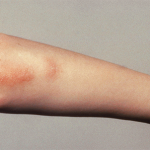In particular, blockade with the drug anakinra, a recombinant human IL-1 receptor antagonist (rhIL-1Ra), has been successfully used to treat refractory cases of MAS.21 There are several reasons to strongly consider the use of rhIL-1Ra as MAS therapy for Ebola hemorrhagic fever (see Table 2). Although rhIL-1Ra does not have a formal indication for use in MAS, it has been tested in more than 6,000 people with a variety of disorders, including those with FDA approval (e.g. rheumatoid arthritis), and as a recombinant human protein that binds excess IL-1 (both IL-1β and IL-1β), it has been shown to be remarkably safe. This includes doses as high as 48 mg/kg/day in sepsis trials where it did not have adverse effects compared with placebo.22 When rhIL-1Ra is effective in treating MAS, the clinical (e.g., fever) and laboratory (e.g., ferritin, AST) improvements are easily tracked and are notable within 24–48 hours. In addition, anakinra has a very short half-life (four to six hours), so even if it was deleterious, it can be stopped and out of the system in very short order. Lastly, it can be given subcutaneously in situations in which intravenous access is limited. Desperate times, an ever-expanding epidemic in which mortality from infection approaches 70%, call for desperate measures. Sometimes, a paradigm shift is in order. In this case, treating the overly exuberant host immune response to the pathogen may provide an opportunity to decrease mortality.
Summary
An epidemic of Ebola virus disease is killing dozens of people daily in Western Africa with no end in sight, and—except passive immunity—there is no effective therapy or vaccine currently available. Like other hemorrhagic fever viruses (Dengue and Crimean-Congo), Ebola infection demonstrates clinical and laboratory features strikingly reminiscent of MAS. MAS secondary to infection can be treated with immunosuppression, dampening the detrimental host immune response. Perhaps, the safest and most rapidly effective therapy for MAS in a time of uncertainty is rhIL-1Ra. It will likely benefit patients with Ebola hemorrhagic fever, but if it does not, it is likely to be safe in the short term and not harmful.
Heaven forbid either of the authors become ill with Ebola virus, but if so, please begin rhIL‑1Ra therapy, and call for a rheumatology consult.

W. Winn Chatham, MD, is professor of medicine and the Louis W. Heck Clinical Scholar in Rheumatology in the Division of Clinical Immunology and Rheumatology at the University of Alabama at Birmingham, where he serves as the associate division director for clinical services. In addition to coordinating clinical and translational studies in the UAB Lupus Clinic, Dr. Chatham has clinical interests in disorders of macrophage activation and immunodeficiency-associated autoimmunity.
